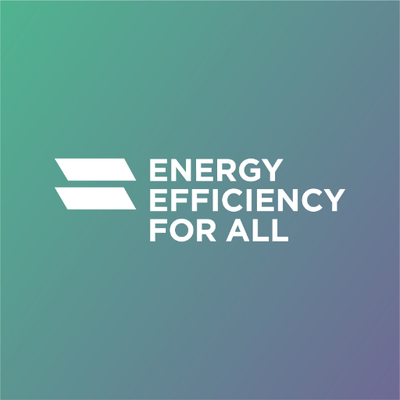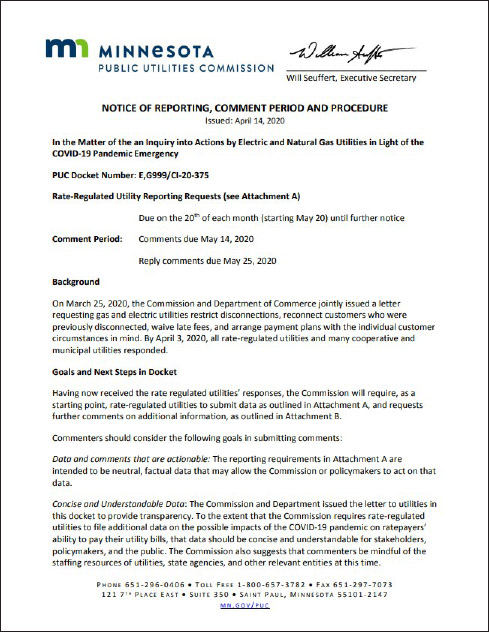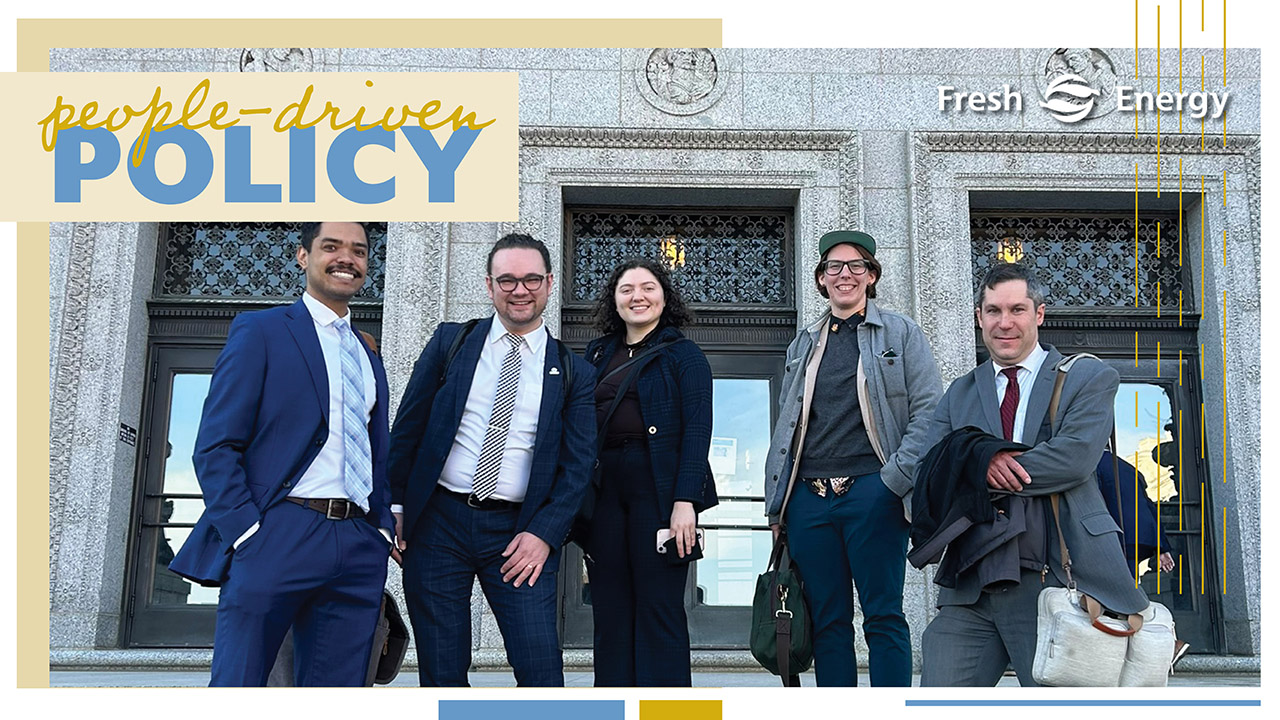

As the COVID-19 pandemic extends into summer, it is continuing to take a significant toll on the health and economic wellbeing of all Minnesotans – especially those already at risk due to our existing structures and systems. To help ease some of the uncertainty and economic burden being borne by some renters and homeowners, Fresh Energy is actively working with our Energy Efficiency for All (EEFA) partners to ensure that Minnesotans facing hardships are able to access funds to help pay for housing expenses, as well as maintain their energy and water utility service.
In late April, Fresh Energy and several of our EEFA partners, including Community Stabilization Project, Inquilinxs Unidxs por Justicia, Midwest Energy Efficiency Alliance, Minnesota Housing Partnership, National Housing Trust, and Natural Resources Defense Council, sent a letter to the Minnesota Department of Employment and Economic Development, Minnesota Housing Finance Agency (Minnesota Housing), and a dozen county and city offices across the state urging them to use Community Development Block Grant (CDBG) funds from the federal coronavirus relief bill to support housing assistance programs. These programs can support rent payments, mortgage payments, and utility expenses, and are especially critical to help under-resourced households remain stably housed during the COVID-19 crisis. Our recommendations were developed with support from the national EEFA project, which tracked the amount of CDBG funds allocated through the federal relief bill and cities and counties that received funds. To date, we are aware that Duluth, Hennepin County, Minneapolis, and Saint Paul have taken our letter under consideration.
In addition to the letter requesting support for housing assistance programs, Fresh Energy and our EEFA partners have continued to advocate for statewide action to protect energy and water utility customers amidst COVID-19. Although many utilities have voluntarily taken action to protect their customers, and the Public Utilities Commission (PUC) has opened an inquiry into responsive actions being taken by utilities during the pandemic, we recognize that some Minnesotans are still at risk of being left behind.
To that end, Fresh Energy and our EEFA partners sent a letter to Governor Tim Walz (also filed with the PUC) urging that the following actions be taken to protect utility customers during the COVID-19 crisis and during the recovery period following the pandemic. These recommendations would not just provide critical support to Minnesotans in this crisis, but could be crucial building blocks as Minnesota comes together to “build back better” in the months ahead.
- Enact a comprehensive, statewide moratorium on utility disconnections for water, electricity, and gas services during the declared state of emergency and the recovery period (e.g., 120 days following the end of the peacetime emergency) that applies to all utility structures, including municipal, investor-owned, and cooperative utilities. Importantly, delivered fuels customers are not currently protected by the voluntary actions taken by electric and natural gas utilities to date and fall outside the purview of the PUC inquiry.
- Direct all Minnesota utilities to prioritize immediate, safe, no-cost reconnection of currently disconnected energy and water customers. Where necessary, also establish emergency water distribution stations for households waiting for their water to be turned back on.
- Immediately expand access to utility and state energy assistance funds during the declared state of emergency and the recovery period by increasing funding and extending the policy changes implemented on April 21, 2020, by the Department of Commerce. These policy changes adjusted existing program policies for Minnesota’s Energy Assistance program by extending the application deadline to July 1, doubling the annual crisis benefit maximum, allowing crisis benefits to pay a household’s past due bill (even without a disconnection notice), and only requiring one month of eligible income (instead of three). We applaud the Department for making these modifications and urge that they be extended as applicable for the duration of the post-pandemic recovery.
- Direct all Minnesota utilities to expand bill payment assistance and set up late-payment forgiveness to reduce energy and water burdens for income-qualified households and households experiencing hardships from COVID-19 during the crisis and the recovery period. If neither are sufficient, offer long-term payment plans.
- Direct all Minnesota utilities to waive all late fees, interest, and penalties due to nonpayment of bills for income-qualified households and households experiencing hardships from COVID-19 during the declared state of emergency and the recovery period. Utilities should also waive convenience fees for online payments.
- Direct all Minnesota utilities to suspend negative credit reporting and, where applicable, debt collection during the state of emergency and the recovery period for income-qualified households and households experiencing hardships from COVID-19.
- Request that the PUC consider special rates and/or credits for income-qualified households to ease energy and water cost burdens during and after the moratorium on disconnection for residential customers and for small businesses required to close during the declared state of emergency and the recovery period.
- Request that the Office of the Attorney General issue a memorandum expanding the jurisdiction and powers of the Commission during the peacetime emergency. In the state of Mississippi, the Attorney General’s office issued a statement that the Public Service Commission’s (PSC’s) order suspending disconnections for water, sewer, gas, and electric utility services was consistent with the governor’s declaration of a state of emergency, and under Mississippi law could be applied to utilities and services not ordinarily within the PSC’s regulatory jurisdiction.
- Direct the Department of Commerce or PUC to hold a virtual energy efficiency stakeholder engagement process and ensure that participation is inclusive and open to all interested parties. This stakeholder engagement process would discuss creating continuity plans for energy assistance, energy efficiency programs, and the energy workforce during the crisis. While energy assistance provides much-needed immediate support to many individuals and families in Minnesota, it is important that customers also have access to energy efficiency services when service providers can safely provide them. Energy efficiency is a critical investment to reduce household utility bills over the long-term and also supports reliability by reducing demand on the system. Further, energy efficiency services also provide local jobs to Minnesotans. These meetings could also include discussions related to future workforce planning as a result of utility and state actions related to COVID-19.
- Supply funds for emergency environmental health-related housing repair and residential services for energy efficiency that remediate severe mold, lead, pest management, and temperature control issues that should be addressed to reduce the prevalence of respiratory illness that can exacerbate COVID-19 outcomes.
- Direct all Minnesota utilities to ensure there are clear and accessible communications, available in multiple languages, to all utility customers about new policies. Utilities should proactively and publicly communicate about all new policies in response to COVID-19, especially those that comply with the above protections for under-resourced customers. In addition, utilities should provide targeted outreach and engagement to ensure that those living with disabilities and/or language and literacy barriers have equal access to energy assistance, energy efficiency programs, and other services.
These recommendations are ambitious, but reliable utility services and equitable, affordable housing are always critical—especially during the COVID-19 crisis—and Fresh Energy is committed to continuing to work with our partners to drive change in these areas. Although these times are incredibly difficult, we recognize that this moment provides an opening to “build back better” and realize our vision of energy and housing systems that work for all Minnesotans.
Join us for a conversation on equitable, super-efficient housing at our virtual Power Panel series, “Truly Affordable,” coming this July—stay tuned for more information on how to register for the series, and keep an eye on our blog, Twitter, and Facebook for updates.


